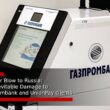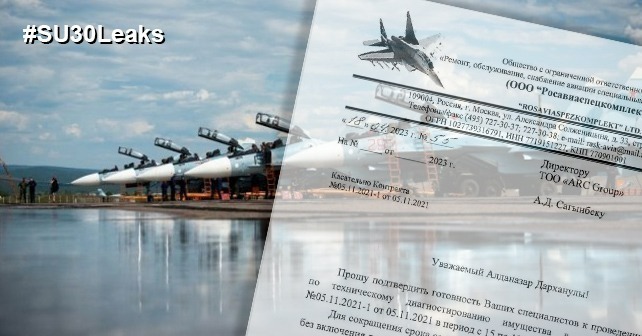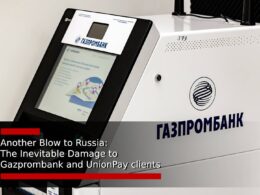In this investigation, we reveal a scheme that allows Russia to continue servicing its military aircraft using French equipment, spare parts, and technology despite international sanctions. Volunteers of international intelligence community InformNapalm collected documents and testimonies exposing a scheme where the Kazakh company ARC Group collaborates with the Russian military to provide maintenance of Russian Su-30SM aircraft equipped with French avionics from Thales and Safran. This example of a Russo-Kazakhstani cooperation shows an intricate arrangement making it possible for the Russians to get access to advanced military technology despite relevant Western sanctions under cover of a Kazakhstani military contractor. We urge both journalists and readers to actively participate in sharing this investigation, which is now available in multiple languages worldwide.
Thales and Safran
As of 2024, Russia has up to 130 modernized Su-30SM generation 4++ fighters. During the Russian invasion of Ukraine, the aggressor lost at least 15 of these aircraft.
The Su-30SM aircraft use foreign-made avionics, primarily from the French companies THALES and SAGEM (or SAFRAN following the acquisition of the latter).
In particular, these machines are equipped with SMD55S and SMD66S multifunctional LCDs, TLS2020 multi-mode receivers, TACAN-NC12 airborne tactical navigation interrogator, HUD 3022 head-up displays manufactured by Thales, and SIGMA 95NAA high-precision inertial navigation system manufactured by Safran.
Without the above equipment, the pilot is effectively blind and the plane turns into a pile of flying metal. In order to continue operating the aircraft and bombing Ukrainian cities, the Russians need to constantly maintain the French equipment.
Long before the full-scale invasion, Russia had ambitious “import substitution” plans for the French equipment, and it looks like this process is slowly moving. Here, in the screenshot from May 2024, we can see the French HUD 3022 replaced with the Russian IKSH-1KI.


However, there are many airplanes in operation, and French equipment needs to be serviced. Whereas, sanctions, albeit slowly, are working against Russia. Only specialists certified by the manufacturer may service the components using certified equipment. After the full-scale invasion, Russia allegedly lost access to such capabilities. However, the documents in our possession clearly show that the Russian side found an excellent channel for bypassing sanctions through a contractor in Kazakhstan.
ARC Group LLC
The Limited Liability Company Analyst Research Consulting Group (ARC Group) was established in Kazakhstan in 2014 by the sole founder Aldanazar Sagynbek [Kaz: Сағынбек Алданазар Дарханұлы], born February 03, 1998.

This entrepreneurial prodigy, at the tender age of 16, started a consulting company which, on top of consulting, stated the following activities in its articles of incorporation: “acquisition and sale of ammunition, weapons and military equipment, spare parts, components and instruments thereof, special materials, equipment for their production, including assembly, adjustment, modernization, installation, use, storage, repair and maintenance.”
This company has looked fishy since its very inception. Kazakhstani data sources mention only five employees. The company’s website https://arcgroup.kz/ contains only a short general description of the company and contacts. However, they indicate that since 2016, ARC Group has been a licensee of the Committee for Industrial Development and Industrial Safety of the Ministry of Industry and Infrastructure Development of the Republic of Kazakhstan and has a state license for the export, import, installation, adjustment, modernization, operation, storage, repair and maintenance of aviation equipment and spare parts.
The company takes a special pride in its distributorship agreement with Safran Electronics & Defense.
“Today, the company is the exclusive distributor of Safran Electronics & Defense in the Republic of Kazakhstan and the Republic of Kyrgyzstan and promotes Safran products in these countries. The main customers of the products are government agencies and law enforcement agencies. There are realized state orders. From 2019 to 2020, the company supplied optoelectronic systems (thermal imaging binoculars, thermal imaging binoculars-rangefinders, rangefinders) to the Republic of Kazakhstan, for a government agency.”

At the same time, the documents and data we received strongly suggest that the ARC Group is actually a front company for the Russians to bypass sanctions.
SANCTIONS-DODGING SCHEME
Back in October 2021, ARC Group signed its first contract with a specialized Russian company Rosaviaspetskomplekt (its name stands for “repair, maintenance, supply of special components for aviation” in Russian).
This contract dated October 25, 2021 openly states its subject: “The CONTRACTOR shall provide services for the maintenance/supply of aviation radio-electronic equipment (avionics) components manufactured by THALES and Safran for Su-30 aircraft.”
There are also noteworthy contractual terms in paragraph 1.2: “The maintenance of avionics shall be performed by certified specialists of the CONTRACTOR having the appropriate confirmation from the manufacturer, at the premises of the CONTRACTOR located in the territory of the Republic of Kazakhstan or in the Russian Federation, at the premises of the CUSTOMER.”
Below is a screenshot of the relevant page of the contract, which was obtained by Inform Napalm.

In simple terms, the subject of this agreement is as follows: the Kazakh side, having French-certified specialists and equipment, must carry out maintenance of French equipment on Russian Su-30 aircraft.
The annex to this contract contains a list of military products for import to Kazakhstan in 2021 – these are the same navigation and situation awareness devices: SMD55S, SMD66S, TLS2020, TAC-NC12, HUD 3022, SIGMA 95NAA. The list also indicates the purpose of such import – “temporary import for overhaul with subsequent re-export in the interests of the Armed Forces of the Russian Federation.”

However, this contract was never signed by the Russian side. Instead, the parties entered into Contract No. 05.11.2021-1 dated November 5, 2021. It is the same in essence; however, it is more “secretive” in terms of wordings. There are no longer any direct references to French companies in the subject; it generically says “maintenance of aviation equipment” instead.
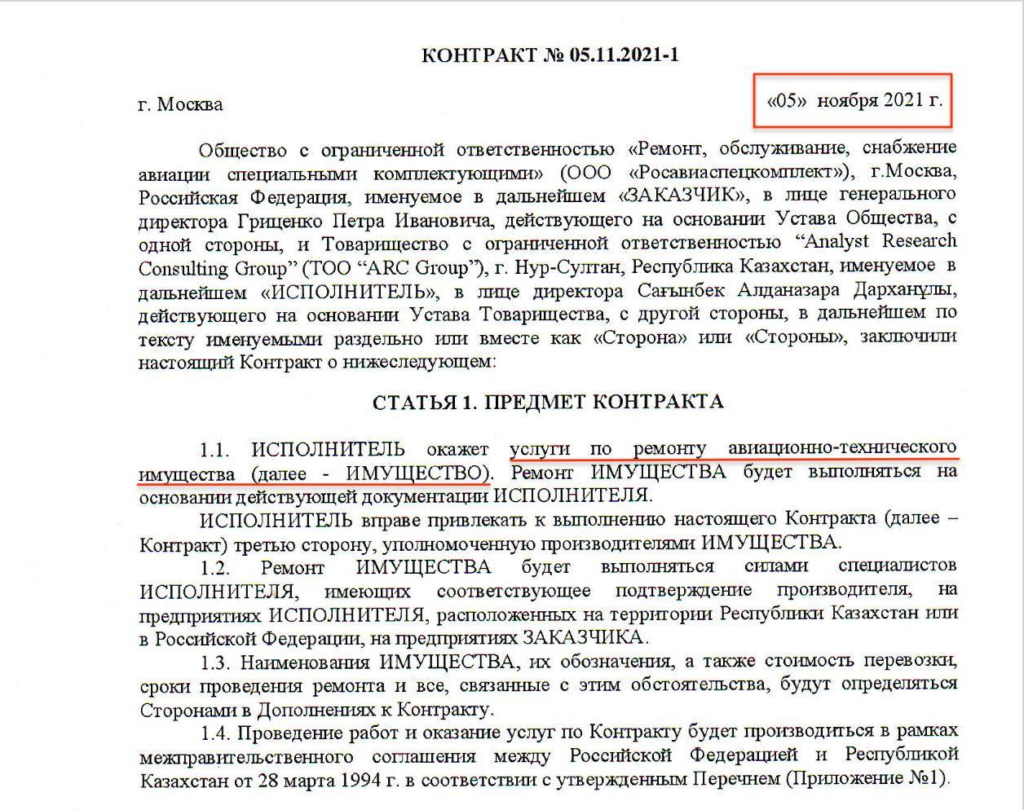
At the same time, the annex to the agreement did not undergo any significant changes – the equipment specification, and the mention of the Russian Armed Forces stayed intact. However, whereas the October contract contained a list of equipment for import to Kazakhstan in 2021, the final contract of November 05, 2021 indicated the planned import period as 2022.

What does this mean? We could make two hypotheses, based on the available ARC documents.
The first: Russia was preparing for the tightening of sanctions against it long before the full-scale invasion. This Kazakhstani company was picked as one of bypass routes, that is why it had to be certified by the French equipment manufacturer.
The second: the said contracts could have been signed retroactively, already after Russia had openly invaded Ukraine, received tougher sanctions, and Thales announced its final exit from the Russian market (June 2022).
The second assumption is supported by a letter from the director of Rosaviaspetskomplekt to the head of the Kazakhstani company dated August 26, 2022. In it, the Director of the Russian company, Petr Gritsenko, informs his counterpart that the planned number of items to be maintained in 2022 is 13 units for an estimated amount of €1,450,000, whereas already in 2023 it is planned to send 88 units for maintenance work worth €6,420,000.
It looks rather strange – the parties sign the contract in November 2021, and 9 months later the Russian side still does not know the exact number of items that need to be maintained. Most likely, the relationship between the companies began to take on practical meaning in the summer of 2022, when Thales left the Russian market.
However, there is something more important in this letter – the Russian side directly expressed its willingness to finance the purchase of a set of automated test equipment from the manufacturer. In other words, the Russians are ready to advance money to the Kazakhs so that they could buy equipment from the French to perform fault diagnostics of the French products installed on Russian aircraft. This is very important considering what happens next.
Let us not forget, all this happens in August 2022, 9 months after signing the contract.

During 2022, 2023 and 2024, the number of units to be maintained is increased several times. The parties make four Annexes to this contract. We will not dwell on them in detail – later we will make the received documentation on this contract publicly available, so let’s move straight to those people who maintain the Russian airplanes.
TRAINED AT THALES
In Annex No. 3 to the contract, signed by the parties in October 2022, the parties specify the basis for the contract pricing. Thus, the price of maintenance includes:
1) training of specialists by the manufacturer – that is, by the French;
2) technical diagnostics of products with subsequent preparation of a report;
3) development of technical documentation for the automated test equipment (ATE);
4) development, manufacture, supply, installation and commissioning of the ATE.
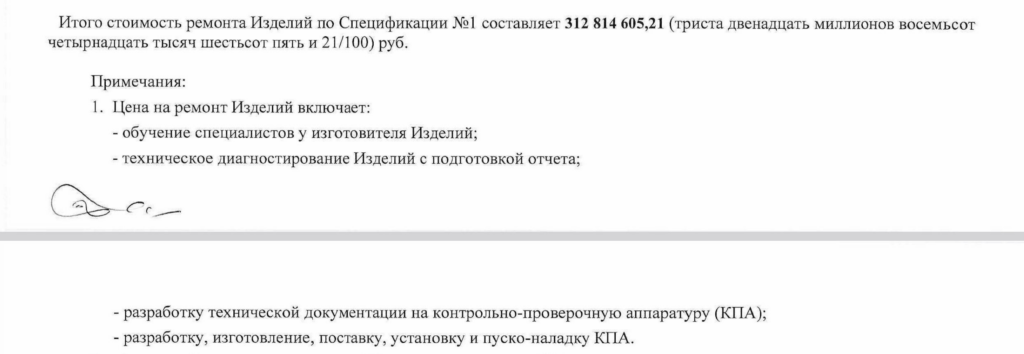
In other words, the Russians pay for the provision of a full cycle of services – from training and certification of Kazakhstani specialists in France to purchasing the necessary equipment from the French.
So, having received funding from the Russians, the Kazakhstani consulting company sends its specialists for training to France. The head of ARC Group informs Petr Gritsenko about the training dates in his letter dated December 9, 2022. There he directly indicates, “from January 16 to 20, 2023, within the framework of our company’s contract with the French company Thales, it is planned to train our specialists in servicing various avionics systems.”
The same letter sets the first time intervals for the arrival of Kazakhstani specialists to the Russian plants – February 2023. That is, immediately after training.

A little later, on January 23, 2023, Aldanazar Sagynbek informs Gritsenko that their specialists have completed a theoretical and practical organizational level of maintenance (OLM) course at Thales on servicing SMD 55S/66S and HUD units. The qualifications of the specialists are confirmed by relevant certificates.
Moreover, more specific dates for the visit of the trained team to Russia have already been determined: from February 6 to 10, 2023.

Apparently, the Kazakhstani side was pressed hard to fulfill its obligations, so on the same day it sent a second letter – with flight routing of their group of specialists from Astana to Irkutsk, the location of the Russian aircraft repair plant.

Who flew in to service the Russians’ equipment? Through access to the archives of Russian databases, Inform Napalm and its partners could establish not only the identities and positions of the specialists, but also obtain copies of their documents.
Ismagulov Kairat [Kaz: Исмагулов Кайрат Серикович], born March 23, 1972 – Advisor to the Director.
Aldanazar Sagynbek, the director of ARC Group, mentioned above.
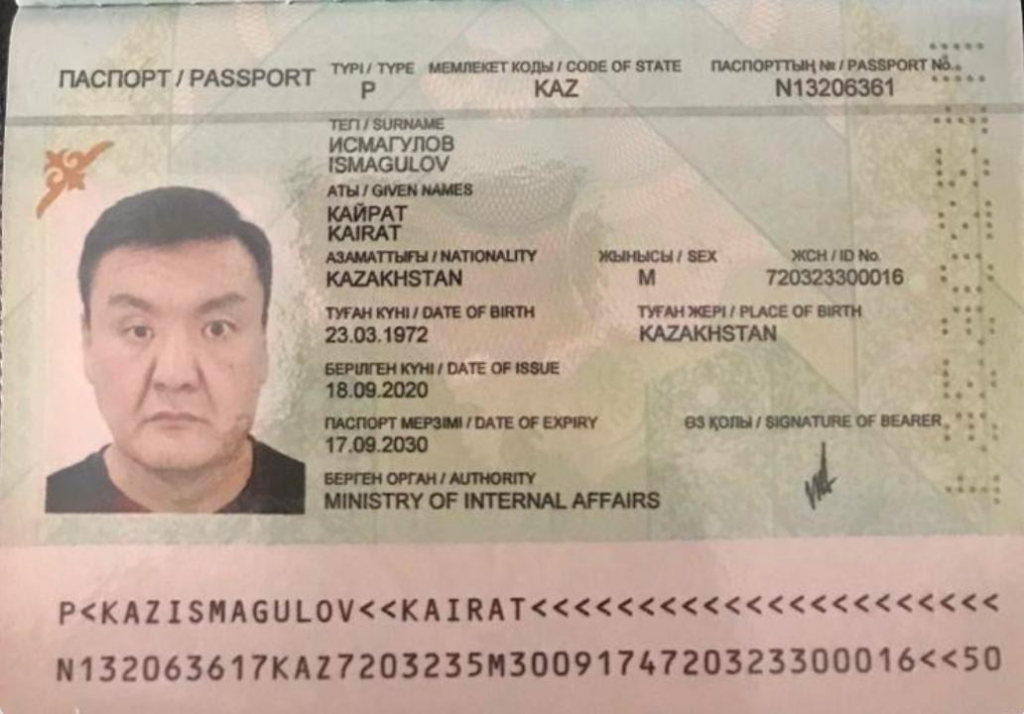
Baurzhan Dairov [Kaz: Даиров Бауржан Сатханович], born December 30, 1971 – Deputy Director.

Anwar Hassan Ahmed Badhaiduh [Kaz: Бадхайдух Анвар Хассан Ахмед], born August 31, 1990 – Deputy Chief Technologist – Engineer for Aviation and Avionics.

Andrey Salnikov [Kaz: Сальников Андрей Юрьевич], born June 15, 1995 – Radio Mechanic for avionics maintenance.

Maxim Sharbekov [Kaz: Шарбеков Максим Канатович], born June 09, 1990 – Radio Mechanic for avionics maintenance.

Alexey Petrashko [Kaz: Петрашко Алексей Вадимович], born September 05, 1968 – Manager.

Shyngis Bekkulov [Kaz: Беккулов Шынгис Шарипович], born March 28, 1987 – Aviation Equipment Engineer.

A little later, two more mysterious individuals were added to this list:
Ushakov K.V. [Kaz: Ушаков Констнатин], born January 28, 1972 – Expert

Gribov M.S. [Kaz: Грибов Максим], born July 21, 1986 – Senior Government Relations Specialist for the Russian Federation.

Given the scope of equipment maintenance and repairs planned by the Russians, this was clearly not a one-time visit. Basically the same group of specialists began to travel to Russia to perform maintenance. For example, in 2 months – in April 2023, Gritsenko informs Sagynbek about a new stage of equipment diagnostics in May 2023. The Russian counterpart asks not to change the group list in order to save time on security clearances, since the aircraft repair plant in Irkutsk is a restricted area.
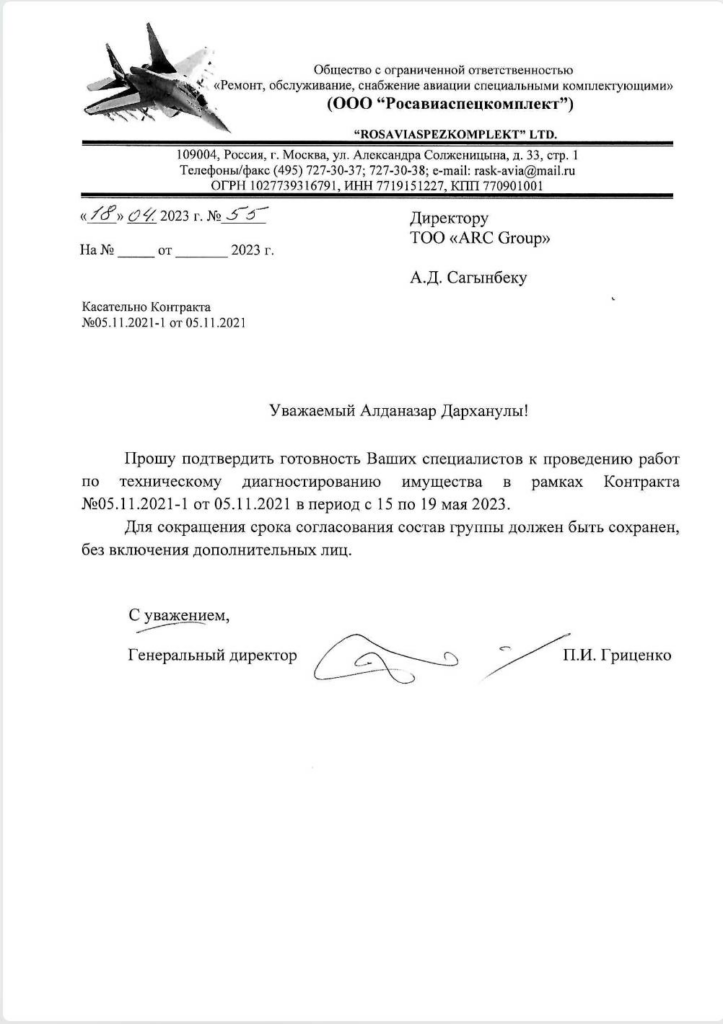
CONTRACT WITH THALES
As we have established, the cooperation between the Kazakhstani ARC Group and Rosaviaspetskomplekt has been going on for at least two years. All this time, the Kazakhstani company cynically misled the French side.
However, the received correspondence shows that an even more cynical event occurs in 2024. Let us recall once again what was established earlier: the Russians want to get not only specialists, but are also ready to finance the purchase by the Kazakhs of equipment for diagnostics of French products on Russian aircraft from the French.
Through one of the sources that provided documents for this investigation, we have at our disposal a draft contract between Thales AVS France SAS and JSC Aircraft Repair Plant No 405 (13 Zakarpatskay street, Almaty, Republic of Kazakhstan).

The contract provides for a full cycle of services from the French side for servicing SMD55S/SMD66S multifunctional LCDs and HUD3022 head-up displays in the interests of the Ministry of Defense of the Republic of Kazakhstan as the final user of Su-30SM aircraft, in particular:
- development and delivery of ILM&OLM Test Benches including 3 years support;
- development and delivery of Golden LRU;
- preparation and delivery of the ILM technical documentation;
- preparation and delivery of ILM training in France;
- installation and commissioning in Kazakhstan.
Note. ILM stands for Intermediate Level Maintenance.
The contract is scoped for 34 months from the date of receipt of the advance payment by the supplier. The contract also contains a visualization of the equipment that French specialists must install and put into operation at the Kazakhstani plant.

The contract has clear export control provisions with a direct ban on transferring any goods to the Russian Federation.
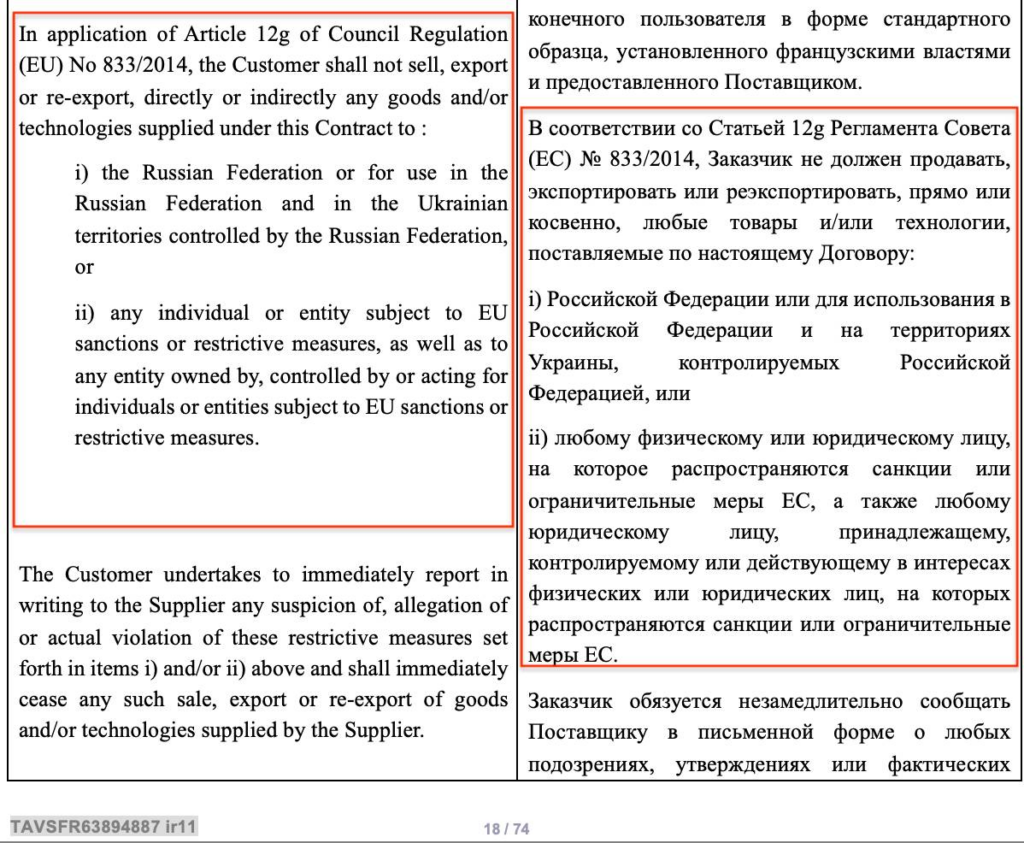
Indeed, the Republic of Kazakhstan has 23 Su-30SM aircraft, with another 36 planes on order. What are the signs then that this contract is being concluded in the interests of the Russians, and that it is not simply an agreement between the French and the Kazakhs for the maintenance of their own aircraft?
One such sign is the commercial offer from the ARC Group to the Russians, fully mirroring the terms of the contract between Thales and JSC Aircraft Repair Plant No 405.
On June 26, 2024, ARC Group sent a commercial offer to the Russians for consideration and registration for a total amount of €13,826,199.26. By a “strange” coincidence, this commercial offer contains almost the same scope and time line of services as the contract between Thales and the Kazakh aircraft plant.
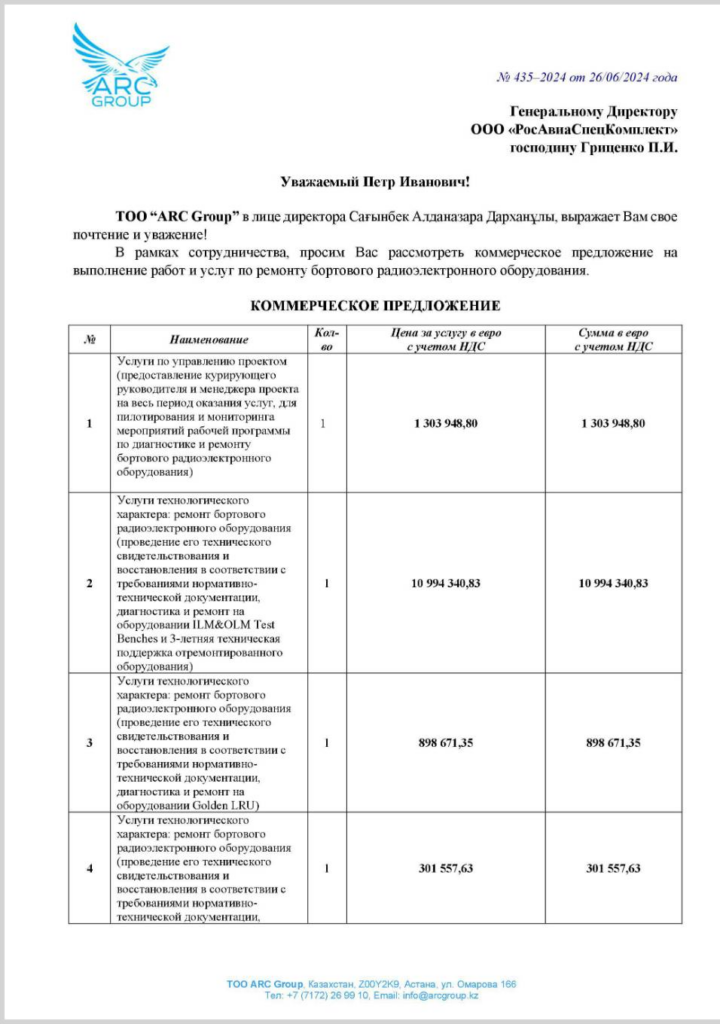
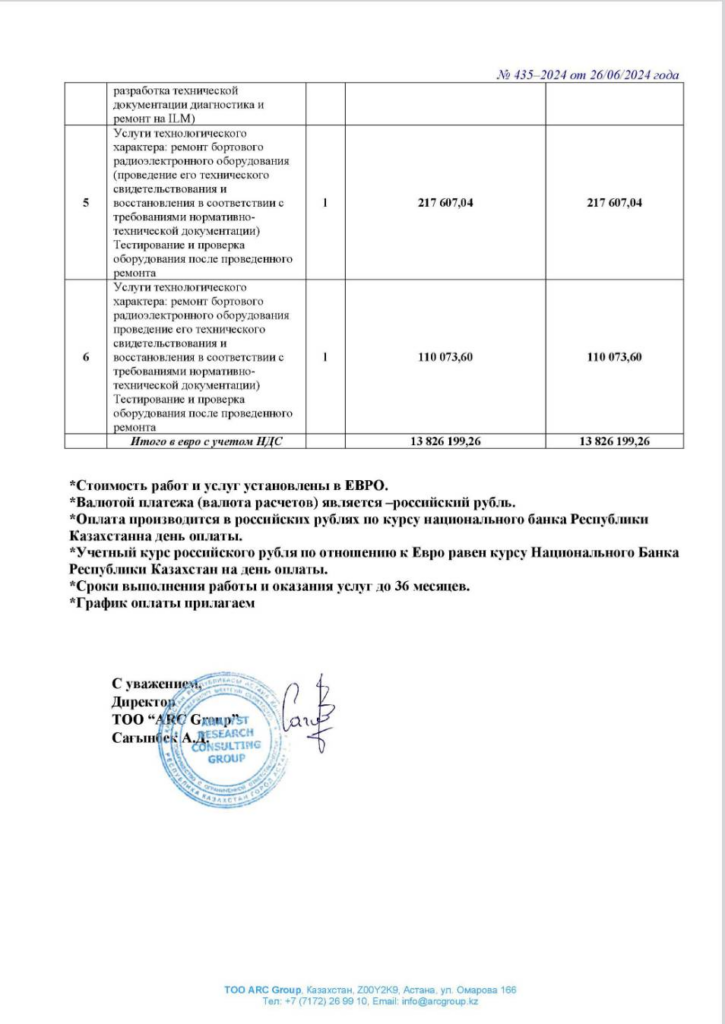
Full final version of the contract between Thales AVS France SAS and JSC Aircraft Repair Plant No 405 – проект договора на поставку оборудования 200624-1(1).docx
Full version of the commercial offer of ARC Group to Rosaviaspetskomplekt – Коммерческое предложение на рассмотрение.pdf
CONCLUSION
In this investigation, we are making public the data on how a Kazakhstani shell company helps a Russian military industry company service high-tech equipment made in France.
We hope that the French companies Thales and Safran will take note that their counterparts are blatantly and cynically lying. On the one hand, they sign documents undertaking not to transfer any goods, equipment and services to third parties, specifically to Russia, and on the other hand, they do the Russians’ bidding and receive funding from them.
We also hope that this story will not end with a simple termination of the contract and revocation of licenses. French companies have the right to demand full compensation for the resources used.
In turn, InformNapalm would like to thank everyone who provided information for this investigation. It allowed us to demonstrate the scale and structure of another Russian sanctions dodging scheme.
Full documentation contained in the correspondence between ARC Group and Rosaviaspetskomplekt will be published soon. To be continued…
Source: informnapalm.org
